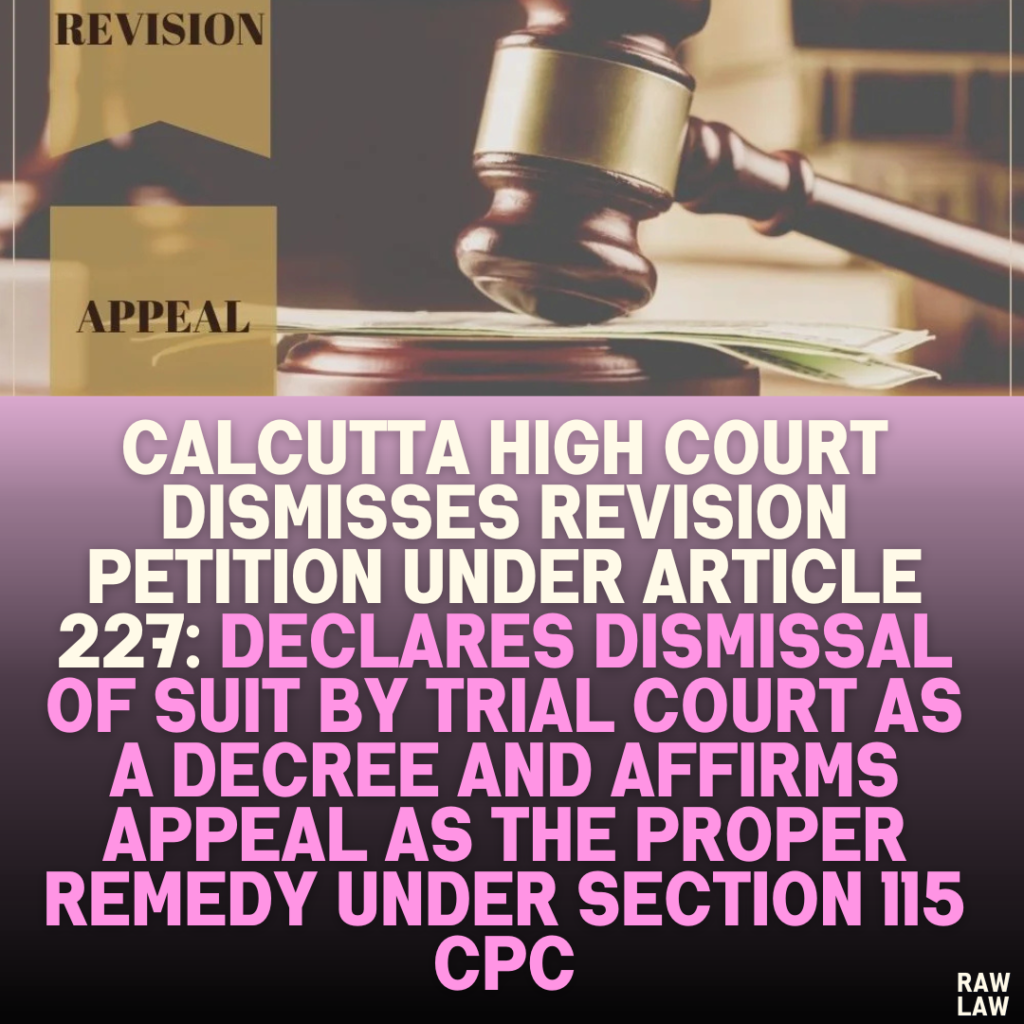Court’s Decision:
The High Court at Calcutta dismissed a civil revision petition filed under Article 227 of the Constitution of India. The court held that the order of the trial court dismissing the suit constituted a decree, making an appeal the appropriate remedy, not a revision. The court ruled that revisional jurisdiction under Section 115 of the Code of Civil Procedure (CPC) is barred if an appeal lies directly or indirectly to the High Court.
Facts:
- Case Background:
- A title suit was filed by the petitioner along with others seeking a declaration and permanent injunction over a property in Malda, specified under R.S. Dag No. 54 and Khatian No. 57.
- The trial court granted an ad-interim injunction and appointed a survey commissioner, who confirmed the petitioner’s possession of his share of the land.
- Procedural Developments:
- Plaintiffs 1 to 6 were represented by a power of attorney holder who passed away. Following this, the petitioner filed a motion to expunge their names, which the trial court allowed, directing the filing of an amended plaint.
- Subsequently, the defendants filed a petition under Section 151 of the CPC to dismiss the suit, arguing that the abatement of claims against Plaintiffs 1 to 6 nullified the entire suit.
- Trial Court’s Order:
- The trial court dismissed the suit, accepting the defendants’ argument that the suit could not proceed due to abatement against Plaintiffs 1 to 6.
- Petitioner’s Response:
- Aggrieved by this dismissal, the petitioner filed a revision application under Article 227, challenging the trial court’s decision.
Issues:
- Primary Issue:
- Whether a revision under Article 227 of the Constitution is maintainable to challenge the dismissal of a suit when the order constitutes a decree.
- Secondary Issue:
- Whether the trial court erred in dismissing the suit despite allowing the petitioner to file an amended plaint.
Petitioner’s Arguments:
- Erroneous Dismissal:
- The trial court acted contrary to its earlier direction allowing the petitioner to file an amended plaint.
- The dismissal disregarded the petitioner’s established possession and title over the property.
- Jurisdiction of the High Court:
- Argued that the High Court, under Article 227, has revisional jurisdiction to set aside the dismissal order.
- Relied on S.S. Khanna v. F.J. Dillon (1963 SCC OnLine SC 72) to support the contention that the High Court can intervene in non-final orders.
- Nature of the Order:
- Claimed that the trial court’s dismissal was procedural and not a substantive adjudication, warranting interference by the High Court.
Respondent’s Arguments:
- Order Qualifies as a Decree:
- Argued that the trial court’s dismissal was a final adjudication of rights, qualifying as a decree under Section 2(2) of the CPC.
- Pointed out that the proper remedy against such orders is an appeal, not a revision.
- Bar on Revisional Jurisdiction:
- Cited J.M. Biswas v. N.K. Bhattacharjee ((2002) 4 SCC 68) to emphasize that revisional jurisdiction under Section 115 CPC is barred when an appeal lies, even indirectly.
- Statutory Provisions:
- Highlighted Order 43 Rule 1(k) of the CPC, which provides for an appeal against dismissal orders, rendering the present revision application untenable.
Analysis of the Law:
- Scope of Revisional Jurisdiction:
- Section 115 of the CPC empowers the High Court to exercise revisional jurisdiction only when no appeal lies. The court clarified that if an appeal lies, whether directly or indirectly, revisional jurisdiction is barred.
- Status of the Dismissal Order:
- Analyzed the definition of a decree under Section 2(2) of the CPC, which requires:
- An adjudication in a suit.
- A determination of the rights of the parties.
- A formal and conclusive decision.
- The court concluded that the trial court’s dismissal order satisfied all these elements, making it a decree.
- Analyzed the definition of a decree under Section 2(2) of the CPC, which requires:
- Application of Precedents:
- Distinguished S.S. Khanna v. F.J. Dillon, stating it dealt with a different context concerning interlocutory orders.
- Reiterated the principles from J.M. Biswas, emphasizing that continuation of non-appealable litigation in such cases is unnecessary.
Precedent Analysis:
- S.S. Khanna v. F.J. Dillon:
- Relevant only for interlocutory orders where no appeal is available.
- Not applicable in cases where an order constitutes a decree.
- J.M. Biswas v. N.K. Bhattacharjee:
- Affirmed the principle that revisional jurisdiction is barred when an appeal lies against the impugned order.
Court’s Reasoning:
- Appeal vs. Revision:
- The court emphasized that revisional jurisdiction is intended for extraordinary cases where no other remedy exists. Since an appeal was available, the revision was not maintainable.
- Status of the Order:
- The court held that the trial court’s order was a conclusive adjudication of rights, qualifying as a decree, and thus appealable under the CPC.
Conclusion:
The revision petition was dismissed. The High Court clarified that:
- The petitioner’s remedy lies in filing an appeal, not a revision.
- No opinion was expressed on the merits of the case as the dismissal was based solely on the lack of maintainability.
Implications:
- Clarification of Jurisdiction:
- Reinforces the principle that revision petitions under Article 227 are not a substitute for statutory appeals.
- Judicial Economy:
- Encourages litigants to pursue remedies in the appropriate forum, reducing unnecessary litigation.
